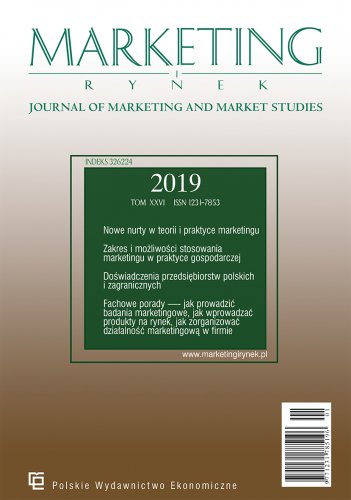Ecologistics as a response of enterprises to the environmental crisis
The author points to the essence and importance of ecologistics in enterprises and supply chains in the context of the growing environmental crisis. Based on the assumption that bottom-up initiatives of individual enterprises, which have their source in the implementation of corporate social responsibility, as well as in striving to improve competitiveness are able to realistically and faster than system projects affect the elimination of the greatest threats to the natural environment, the author presents solutions in the field of ecologistics, which can be applied in any enterprise regardless of its status. The purpose of the discussion undertaken in the paper is to present the author's model of the level of development of ecologistics and the system of evaluation of activities in this field in the enterprise and the supply chain.
References
Baraniecka, A. (2018). Ekologistyka. W: J.Witkowski, A. Baraniecka (red.), Japońskie łańcuchy dostaw w Europie. Zarządzanie i rozwój. Warszawa: PWE.
Baraniecka, A. (2013). Supply Chain Development Process. W: M. Szymczak (red.), Managing Toward Supply Chain Maturity. London: Polgrave MacMillan. https://doi.org/10.1057/9781137359667.0008
Baraniecka, A. (2014). Kurs e-learningowy Ekologistyka w przedsiębiorstwie. Moduł: Ocena ekologistyki. Projekt Kuźnia Kadr IV, Uniwersytet Ekonomiczny we Wrocławiu.
Berishy, N.M. i Scholz-Reiter, B. (2016). Development and implementation of a green logistics-oriented framework for batch process industries: Two case studies. Logistics Research, 9(216), 1-10. https://doi.org/10.1007/s12159-016-0137-8
Bolstorff, P. i Rosenbaum, R. (2007). Supply Chain Excellence. A Handbook for Dramatic Improvement Using the SCOR Model. New York: AMACON.
Carbon Trust. (2006). Carbon footprints in the supply chain: The next step for business. UK: Carbon Trust. Pozyskano z: http://www.carbontrust.co.uk
Carbon Trust. (2016). Supply Chain Transformation and Resource Efficiency. UK: Carbon Trust. Pozyskano z: http://www.carbontrust.co.uk
CDP. (2015). Climate Change Report 2015: Companies and Cities for Low Carbon Economy In Central and Eastern Europe. CDP CEE Report. Pozyskano z: www.cdp.net
Choi, Y. i Zhang, N. (2011). Does proactive green logistics management improve business performance? A case of Chinese logistics enterprises. African Journal of Business Management, 5(17), 7564-7574. https://doi.org/10.5897/ajbm11.613
GIOS. (2018). Stan środowiska w Polsce. Raport 2018. Warszawa: Główny Inspektorat Ochrony Środowiska, Departament Monitoringu, Ocen i Prognoz Stanu Środowiska. https://doi.org/10.12775/ppos.2014.040
IPCC. (2018). Report. Global Warming of 1,5oC. Switzerland: IPCC. Pozyskano z: http://www.ipcc.ch/report/
Korzeń, Z. (2001). Ekologistyka. Poznań: Instytut Logistyki i Magazynowania.
Lee, F, Su-Yol, I. i Klassen, R-D. (2008). Drivers and Enablers That Foster Environmental Management Capabilities in Small- and Medium Sized Suppliers in Supply Chains. Production and Operations Management Society, (17). https://doi.org/10.3401/poms.1080.0063
Li, F., Schwarz, L. i Haasis, H.-D. (2016). A fremework and risk analysis for supply chain emission trading. Logistics Research, 9(1).
Linton, J.D., Klassen, R. i Jayaraman, V. (2007). Sustainable supply chain: An introduction. Journal of Operations Management, (25), 1075-1082. https://doi.org/10.1016/j.jom.2007.01.012
Mesjasz-Lech, A. (2011). Efektywność ekonomiczna i sprawność ekologiczna logistyki zwrotnej. Czestochowa: Technical University of Czestochowa.
Michniewska, K. (2012). Ekologistyka. Praktyczne wykorzystanie w biznesie. Logistyka odzysku, 1(2).
Murkowski, A. i Skórska, E. (2016). Czy dwutlenek węgla w powietrzu ma wpływ na sprawność intelektualną człowieka? Kosmos. Problemy nauk biologicznych, 65(4), 631–636.
Pfohl, H.Ch. (1998). Systemy logistyczne. Podstawy organizacji i zarządzania. Poznań: ILiM.
Piniecki, R. (2002). Realizacja zasad ekologistyki. W: D. Kisperska-Moroń, E. Płaczek, R. Piniecki (red), Koszty zewnętrzne logistyki w zarządzaniu łańcuchem dostaw. Katowice: Wyd. AE w Katowicach.
Poirier, Ch.C. i Quinn, F.J. (2004). How are we doing – A Survey of Supply Chain Progress. Supply Chain Management Review, 8.
PSDB. (2008). Raport, pt. Potencjał małych i średnich przedsiębiorstw w dziedzinie kreowania nowych produktów innowacyjnych - rozwiązania proekologiczne. Warszawa: PSDB, Grupa WYG.
Rad, S.T. i Gülmez, Y.S. (2017). Green Logistics for Sustainabilit, International Journal of Management Economics and Business, 13(3).
Rao, P. i Holt, D. (2005). Do green supply chains lead to competitiveness and economic performance? International Journal of Operations & Production Management, 25(9), 898-916. https://doi.org/10.1108/01443570510613956
Rodrigue, J.P., Slack, B. i Comtois, C. (2012). Green logistics. Pozyskano z: http://people.hofstra.edu/geotrans/eng/
Sarkis, J. (2012). A baundaries and flows perspective of green supply chain management. Supply Chain Management. An International Journal, 17(2). https://doi.org/10.1108/13598541211212924
Sbihi, A. i Eglese, R.W. (2009). Combinatorial optimization and Green Logistics. Annals of Operations Research, 175(1), 159-175. https://doi.org/10.1007/s10479-009-0651-z
Seroka-Stolka, O. (2014). The development of green logistics for implementation sustainable development strategy in companies. Procedia - Social and Behavioral Sciences, (151), 302-309. https://doi.org/10.1016/j.sbspro.2014.10.028
Seuring, S. i Müller, M. (2008). From a literature review to a conceptual framework for sustainable supply chain management. Journal of Cleaner Production, 16(15), 1699-1710. https://doi.org/10.1016/j.jclepro.2008.04.020
Słupik, S. (2014). Ekologiczna społeczna odpowiedzialność biznesu w strategiach rozwoju firm. Gospodarka w praktyce i teorii, 3(36). https://doi.org/10.18778/1429-3730.36.06
UN. (2019). Report. Global Environment Outlook. GEO-6. Healthy Planet, Healthy People. Cambridge University Press: United Nations Environment Programme. https://doi.org/10.1017/9781108627146
Wang, Z. i Sarkis, J. (2013). Investigating the relationship of sustainable supply chain management with corporate financial performance. International Journal of Productivity and Performance Management, 62(8), 871-888. https://doi.org/10.1108/ijppm-03-2013-0033
WMO. (2019). Report WMO Statement on the State of the Global Climate in 2018. Geneva: World Meteorological Organization. https://doi.org/10.1093/law:epil/9780199231690/e577
World Bank. (2018). Connecting to Compete 2018 Trade Logistics in the Global Economy. The Logistics Performance Index and Its Indicators. Washington: The International Bank for Reconstruction and Development, The World Bank.
Zsidisin, G.A. i Siferd, S.P. (2001). Environmental purchasing: A framework for theory development. European Journal of Purchasing and Supply Management, 7(1), 61-73. https://doi.org/10.1016/s0969-7012(00)00007-1
Zuzek, D.K. (2017). Świadomość ekologiczna przedsiębiorców jako element zrównoważonego rozwoju. Studia Ekonomiczne. Zeszyty Naukowe Uniwersytetu Ekonomicznego w Katowicach, (326), 166–169. https://doi.org/10.33119/se.2017.309

